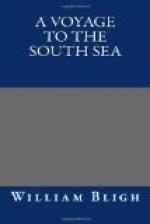The oysters which we found grew so fast to the rocks that it was with difficulty they could be broken off, and at length we discovered it to be the most expeditious way to open them where they were fixed. They were of a good size, and well tasted. To add to this happy circumstance in the hollow of the land there grew some wire-grass, which indicated a moist situation. On forcing a stick, about three feet long, into the ground we found water, and with little trouble dug a well which produced as much as our occasions required. It was very good, but I could not determine if it was a spring or not. We were not obliged to make the well deep for it flowed as fast as we emptied it, which, as the soil was apparently too loose to retain water from the rains, renders it probable to be a spring. On the south side of the island likewise we found a small run of good water.
Besides places where fires had been made there were other signs of the natives sometimes resorting to this island. I saw two ill-constructed huts or wigwams which had only one side loosely covered, and a pointed stick was found, about three feet long, with a slit in the end of it to sling stones with, the same as the natives of Van Diemen’s land use.
The track of some animal was very discernible and Nelson agreed with me that it was the kangaroo; but whether these animals swim over from the mainland, or are brought here by the natives to breed, it is impossible to determine. The latter is not improbable as they may be taken with less difficulty in a confined spot like this than on the continent.
The island is about a league in circuit: it is a high lump of rocks and stones covered with wood; but the trees are small, the soil, which is very indifferent and sandy, being barely sufficient to produce them. The trees that came within our knowledge were the manchineal and a species of purow; also some palm trees, the tops of which we cut down, and the soft interior part or heart of them was so palatable that it made a good addition to our mess. Nelson discovered some fern-roots which I thought might be good roasted as a substitute for bread, but in this I was mistaken: it however was very serviceable in its natural state to allay thirst, and on that account I directed a quantity to be collected to take into the boat. Many pieces of coconut shells and husk were found about the shore, but we could find no coconut trees, neither did I see any on the main.
I had cautioned the people not to touch any kind of berry or fruit that they might find; yet they were no sooner out of my sight than they began to make free with three different kinds that grew all over the island, eating without any reserve. The symptoms of having eaten too much began at last to frighten some of them but, on questioning others who had taken a more moderate allowance, their minds were a little quieted. The others however became equally alarmed in their turn, dreading that such symptoms would come




